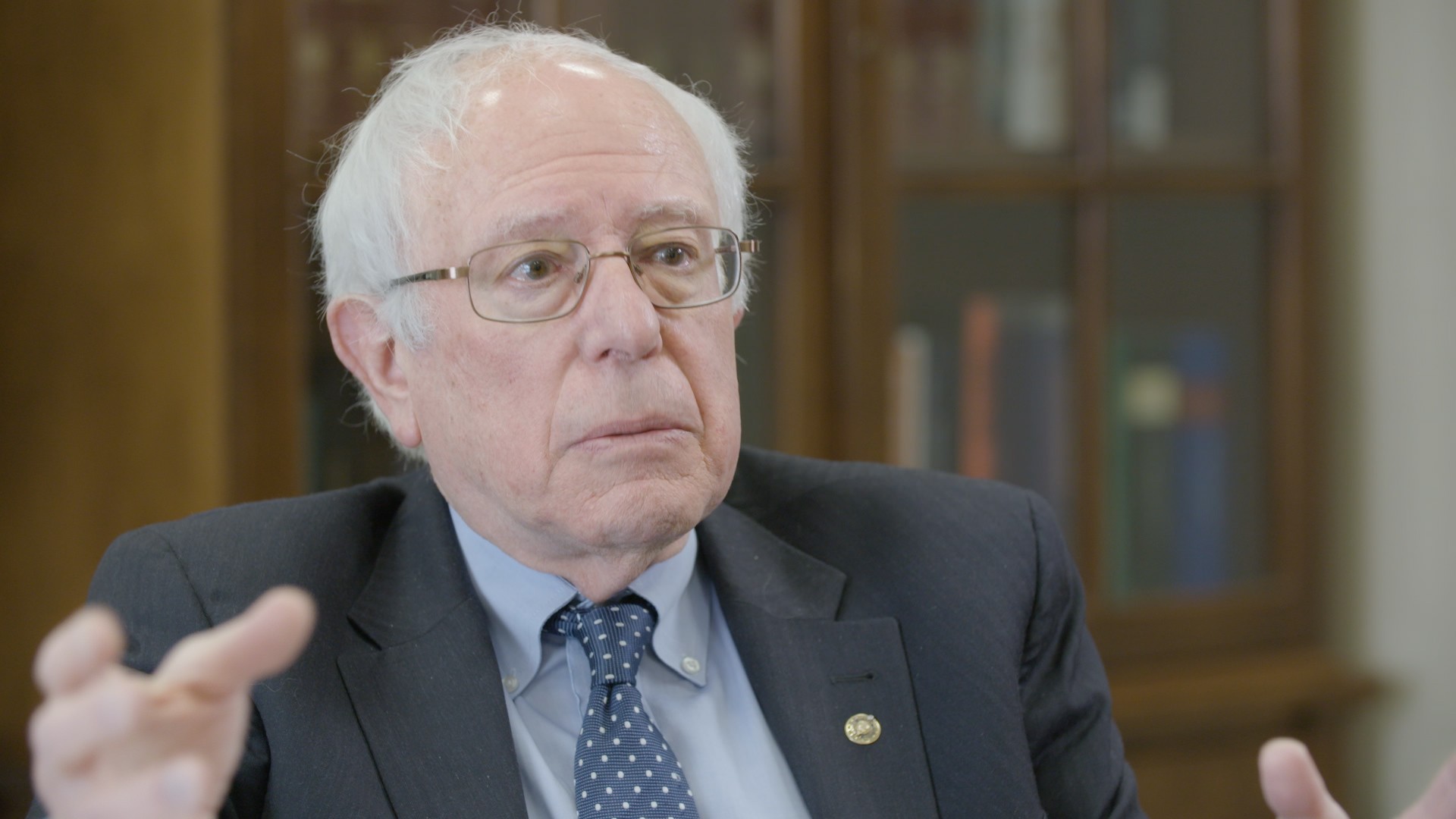A pro-Bernie Sanders piece of art at Coachella in 2016. Photo by Kevin Winter/Getty Images for Coachella
Over the last few weeks, it's become clear that Bernie Sanders could actually become president. The Vermont senator is polling very close to Joe Biden in Iowa, has a large lead over everyone in the latest California poll, and seems likely to do very well in New Hampshire. The prospect of Sanders winning the nomination has the finance world freaking out—there are already reports of stocks falling as he climbs the polls—and has inspired a backlash from his many detractors. Centrist pundits have declared him to be unelectable, and his former competitor Hillary Clinton has denounced not just Sanders but the entire "culture around him," which she recently described to the Hollywood Reporter:Standard-issue online sparring is often conflated with threats, and Sanders supporters feel frustrated they are so often associated with the worst behavior of their fellow travelers. "Most Bernie supporters online tend to be young, somewhat irony-poisoned, and angry. I'm including myself in this group," Joe Conley, a 33-year-old Sanders supporter, told me over email. He pointed out that there’s an "irony gap" between Bernie supporters and people on the receiving end of their ire. While tweeting a photograph of a pig with shit on its balls might be a standard-issue troll for a member of left Twitter, it’s perceived as online harassment from people who aren’t acquainted with this language of certain subcultures. At the end of the day, every political tribe has its toxic streak, so why do "Bernie Bros" get singled out?Even as a self-identified Bernie Bro, I’ve gotten a fair amount of grief from leftist dudes on the internet. But I’ve received an equal heaping of hate from women who supported Clinton, anti-semitic Trump trolls, and beyond. Though fewer in number than Sanders supporters, Andrew Yang backers can be just as fiery online—notably, there are a significant number of irony-drenched #YangGang members from 4chan and other Trump-adjacent corners of the internet. Tulsi Gabbard, another Democrat with fringe appeal, has an intense fan base that contains members of the far right. In general, the culture around political celebrities has become more like regular celebrity stan culture, meaning fans feel intense emotions and share them online, and campaigns have little control over those feelings. (Sanders’s popularity is forever intertwined with his online army, but his campaign does not promote cyberbullying or misogyny—as the Times story noted, the Sanders campaign has publicly condemned bullying. That hasn't stopped it.)One Bernie supporter sent me a dossier of all the abuse Bernie supporters receive from "loyalist Democrats" and "Donut Twitter." (Anti-Bernie liberals sometimes use a donut emoji in their Twitter names. It's a long story.) This collection of screenshots is really ugly, with people tweeting things like "I’m rooting for Bernie supporters' death," and "anyone that fucking supports Bernie Ratfucker Sanders is a piece of shit." There is also a glut of disgusting, unquotable, racist and misogynistic insults that have been hurled at Nina Turner, a Black woman who has worked with Sanders for years and co-chairs his 2020 campaign. (VICE was unable to confirm the authenticity of all of the screenshots and is not linking to the file, but did verify that many of the abusive tweets were real.) The fact is, the internet is a cruel place for everyone, regardless of who you’re voting for in 2020."I really think we are no more mean or aggressive than any other group of people," said Peter Graham, a 28-year-old who works for Disney and is voting for Bernie. "[It’s that] Bernie has younger supporters that are very online, [they] are probably better versed in sardonic Twitter dialogue, and there's more of them."

The stereotype of a nasty online leftist bro—unmistakably masculine, usually sneering—predates that election season. In 2008, the feminist writer Rebecca Traister (then a Clinton supporter) published an op-ed on Salon, bemoaning the rise of the "Obama boys." Young women who backed Clinton, she wrote, told her "about the sexism they felt coming from their brothers and husbands and friends and boyfriends [and] described the suspicion that their politically progressive partners were actually uncomfortable with powerful women."Leftists have accused the mainstream media of using this stereotype as a club to beat Sanders with. "The ‘Bernie Bro' narrative by pro-Clinton journalists has been a potent political tactic," Glenn Greenwald wrote on The Intercept in 2016, calling it "a journalistic disgrace." And the idea that the democratic socialist's base is largely male is arguably just straight-up false: Polls have shown that Sanders supporters are diverse across racial and gender lines, with young women making up a larger proportion of his support than young men.Yet the narrative has remained pervasive, likely because there are plenty of genuinely nasty Bernie supporters lurking online, and more recently, because Sanders has achieved frontrunner status. Since his rise in the polls, Bernie has received a deluge of negative press from mainstream publications. "This isn’t about Sanders supporters being uniquely toxic. It’s about Sanders leading in Iowa and New Hampshire and leading a genuinely diverse working class movement," one Bernie supporter tweeted in response to the New York Times article. "Elite liberals fear and despise the working class. That’s the reality.""This is ruling class propaganda," another remarked. "And rather than keeping Bernie above the fray, the campaign's scolding of supporters was used to validate their false narrative of abusive Berners, as I feared it would be. Damned if you do, damned if you don't. So don't."Peter Daou, a former Hillary aide turned Bernie diehard, expressed dismay about the Bernie Bro stereotype over the phone. He said that he and his wife, Leela, now "receive the same type of personal attacks" as he did in 2016, when he was loudly supporting Clinton online. "People are using the term ‘Bernie Bro’ in a targeted way,” he said. "It’s a toxic narrative, leftover from 2016. The idea of these raging white males online that all support Bernie is the establishment’s way of trying to torpedo Bernie’s campaign."Jovan Prunty, a 31-year-old who works in construction, also takes offense at the Bernie Bro narrative. "As a Black man I think this term erases me and all his other women and POC supporters," he said.Small, persistent jabs from Bernie supporters are unsurprisingly hurtful to people who support other candidates. Zandy Hartig, a Los Angeles-based actress, who backs Elizabeth Warren, tweeted on Wednesday, "It sucks that I feel I can’t tweet about my favorite candidate. my friends are respectful when they argue with me, but random people will jump all over me. It’s not their candidate’s fault, but it scares me nonetheless. And maybe that’s the point." Unkindness ensued, with Bernie supporters informing her that Warren does, in fact, suck, and imploring her to "calm down.""I don’t think it’s Bernie fault," Hartig emphasized to me over the phone. "But I don't want to comment [anything pro-Warren] because when I have, people come down really hard on me and I almost feel like going private." (Her Twitter is currently private)."During the 2016 election, I really didn’t think there was such a thing as a 'Bernie Bro,'" Hartig continued. "But this time, we’ve got a woman running who is much more progressive [than Hillary]… I’m starting to think it has a lot to do with misogyny."The nastiness of online political culture has resulted in a gap between those like Hartig, who feel attacked by swarms of online Bernie heads, and Sanders supporters who complain that they are being unfairly stereotyped. Misogyny exists in every corner of the internet, they say. So why are we mostly talking about Bernie Sanders? "You’re gonna tarnish an entire movement as 'bros'?" Daou said. "[It] erases all the women, the women of color. There’s an ageist, a sexist, and a racist component when you generalize a diverse movement under the term 'Bro.'"Sign up for our newsletter to get the best of VICE delivered to your inbox daily.
Advertisement
It's his leadership team. It's his prominent supporters. It's his online Bernie Bros and their relentless attacks on lots of his competitors, particularly the women. And I really hope people are paying attention to that because it should be worrisome that he has permitted this culture — not only permitted, [he] seems to really be very much supporting it.
The "Bernie Bro" stereotype isn't new, of course, but the notion that Sanders supporters are different from other Democratic voters, and even dangerous in some way, seems poised to dominate the never-ending debate over the 2020 primary. It scored a major piece of ink on Monday, when the New York Times ran a front-page story headlined, "Bernie Sanders and His Internet Army." It describes a passionate fan base who donates their money and time to their candidate, but also sometimes attacks opponents with insults and even threats."When Mr. Sanders’s supporters swarm someone online, they often find multiple access points to that person’s life, compiling what can amount to investigative dossiers," the Times wrote. "They will attack all public social media accounts, posting personal insults that might flow in by the hundreds."If you’ve ever posted anything slightly critical of Sanders, this sort of dogpiling may sound familiar. (Full disclosure: I'm a Sanders supporter who yes, spends a fair amount of time online.) Interviews with dozens of Sanders backers find them admitting that the "internet army" can at times be vicious—a reality that many leftists themselves bemoan. But they also see the Bernie Bro narrative as an invention of the media and the Democratic establishment.
Advertisement
Advertisement

The stereotype of a nasty online leftist bro—unmistakably masculine, usually sneering—predates that election season. In 2008, the feminist writer Rebecca Traister (then a Clinton supporter) published an op-ed on Salon, bemoaning the rise of the "Obama boys." Young women who backed Clinton, she wrote, told her "about the sexism they felt coming from their brothers and husbands and friends and boyfriends [and] described the suspicion that their politically progressive partners were actually uncomfortable with powerful women."
Advertisement
Advertisement
Sanders supporters generally agree that there are toxic leftist men whose behavior is out of bounds. But they insist that those people are a minority. Jaya Sundaresh, a writer for the socialist publication Current Affairs, voiced that sentiment on her Twitter in a post that garnered 15,000 likes: "I'm just going to say it: the Bernie Bro stereotype might be bullshit, but there's a variety of irony-poisoned shithead leftist dudes who have caused nothing but pain for myself and my female comrades." Over the phone Sundaresh was careful to emphasize that even though shitty men do exist on the left, the phenomenon is not specific to one edge of the ideological spectrum. "I’ve been swarmed by Pete Buttigieg supporters," she said. "I’ve also had good conversations with them."
Advertisement
